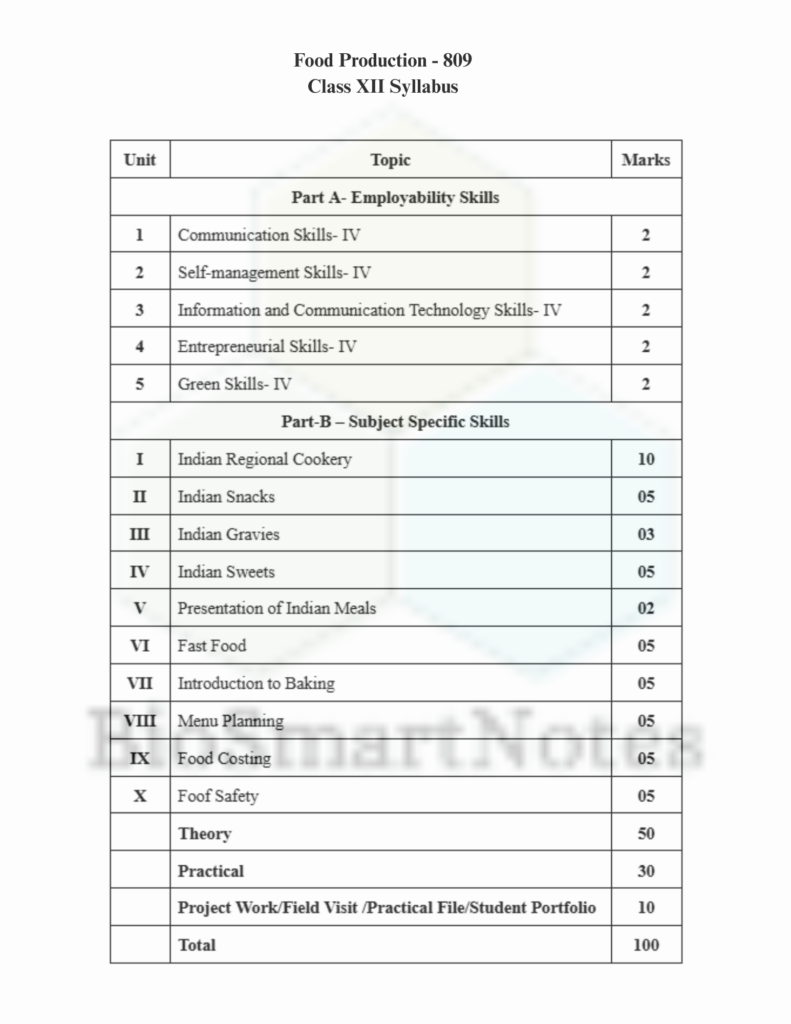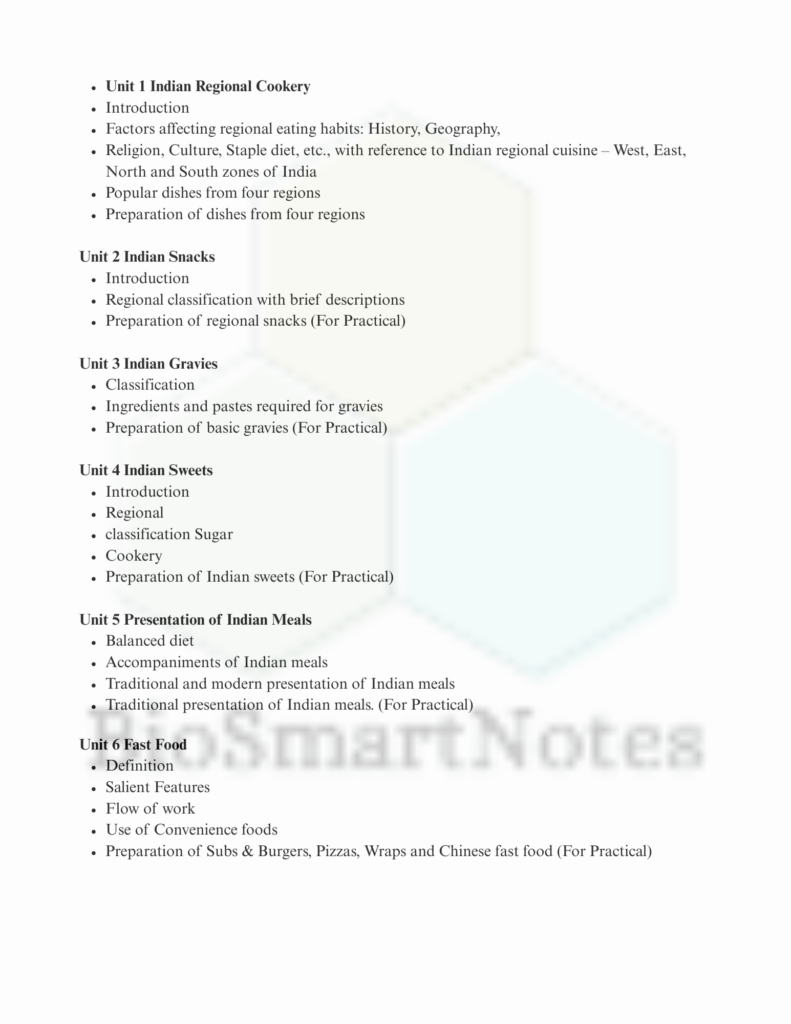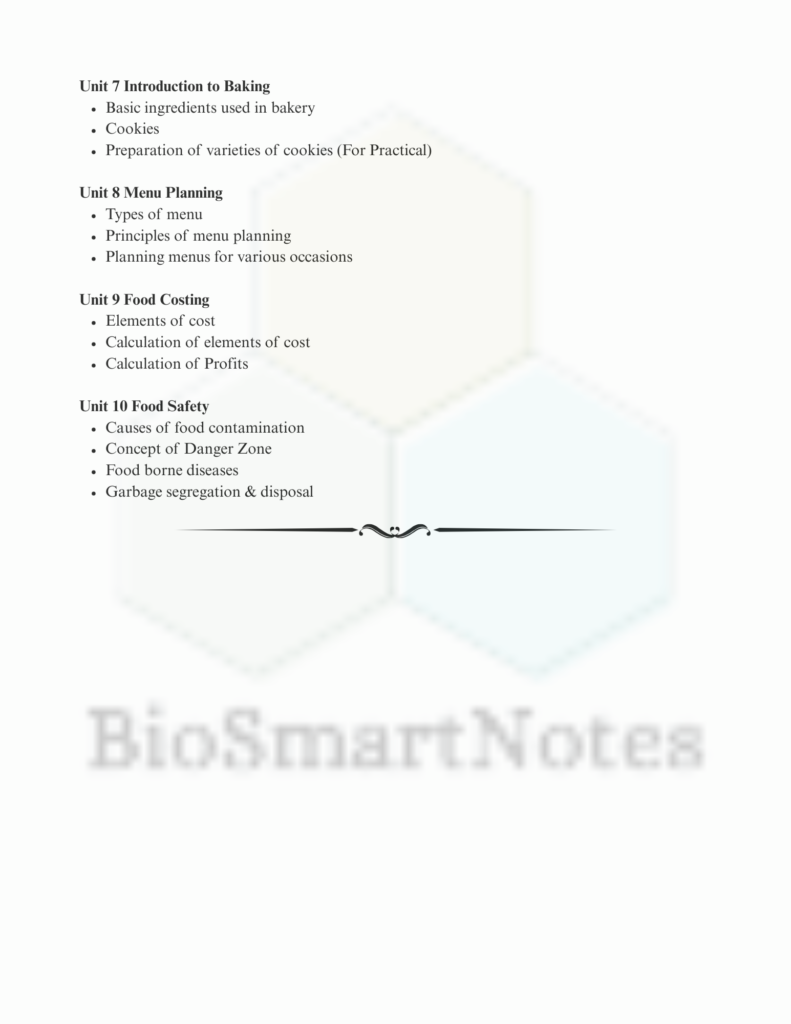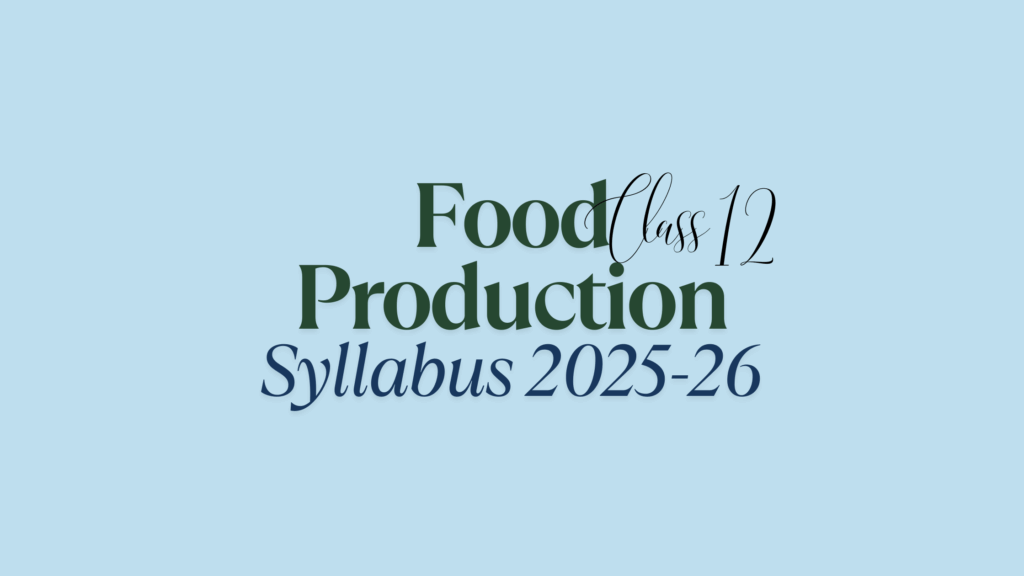Food Production is one of the most dynamic and skill-oriented subjects offered in the vocational stream of Class 12. It is especially ideal for students interested in culinary arts, hotel management, catering services, and entrepreneurship in the food and beverage industry. The Class 12 Food Production Syllabus 2025-26 is designed to give students both theoretical understanding and practical training in kitchen operations, food handling, cooking techniques, and safety standards.
Whether you plan to work in a professional kitchen, start your own food business, or continue your studies in hospitality, this subject offers a strong foundation in real-world culinary skills and knowledge.
Why Study Food Production in Class 12?
Food Production is more than just cooking—it’s the science and art of preparing food using professional methods, tools, and hygiene practices. The subject provides:
- Practical skills for working in hotel and restaurant kitchens
- Basic knowledge of various cuisines and cooking styles
- Awareness of food safety and hygiene regulations
- Insights into kitchen planning, time management, and teamwork
- Career opportunities in the ever-growing food industry
This subject is ideal for students who enjoy cooking, want to explore global cuisines, or are curious about how commercial kitchens operate.
Class 12 Food Production Syllabus 2025-26



What You’ll Learn in Class 12 Food Production
While the detailed syllabus may vary slightly based on your education board, most programs cover the following key areas:
- Advanced Cooking Methods: Learning techniques like roasting, braising, grilling, baking, poaching, and steaming.
- Continental and Regional Indian Cuisine: Understanding popular dishes, presentation styles, and ingredient usage from various cultures.
- Kitchen Organization: Knowledge of different kitchen sections (garde manger, hot kitchen, bakery) and equipment used in professional setups.
- Portion Control and Food Costing: Basics of measuring, controlling waste, and planning for profit in food service.
- Food Safety and Hygiene: Ensuring safe food practices, personal hygiene, sanitation, and understanding HACCP standards.
- Workplace Communication and Team Skills: Importance of coordination, verbal communication, and time management in a professional kitchen.
- Menu Planning and Food Presentation: Designing balanced menus, plate garnishing, and food aesthetics.
Each topic combines theory with hands-on practical work to simulate real-life kitchen environments and challenges.
How to Study Food Production Effectively
Here are some practical ways to succeed in the subject and master both theory and application:
✅ Practice in a Real Kitchen Setting
If your school has a training kitchen, use the equipment regularly to become familiar with culinary tools, knives, burners, and cooking ranges.
✅ Learn Recipes and Techniques Step-by-Step
Understand not just the recipe, but why certain steps or ingredients are used. This builds your culinary logic and problem-solving ability in the kitchen.
✅ Maintain a Recipe Journal
Write down key recipes, cooking methods, and ingredient portions in your own words. This helps in both exam preparation and future kitchen use.
✅ Study Food Safety Guidelines Carefully
This section is often theory-heavy, so make sure to remember proper hygiene rules, kitchen layouts, and food handling protocols.
✅ Watch Demonstrations and Cooking Shows
Visual learning is powerful—use educational cooking videos to watch techniques in action and improve your own execution.
Practical Component of Food Production
A major portion of this subject is focused on skill-based learning through practical exams and demonstrations. Your practical work may include:
- Preparing a full-course meal or individual dishes from specific cuisines
- Presenting dishes with appropriate garnishing and plating
- Demonstrating correct knife handling and cooking techniques
- Following food hygiene practices during cooking
- Creating a basic menu plan based on nutritional and budgetary guidelines
Maintain a well-organized practical file with clear documentation of recipes, ingredients, preparation steps, and outcomes. Examiners often evaluate your ability to present, explain, and prepare dishes confidently.
Career Scope After Studying Food Production
After completing Class 12 with Food Production, students can pursue further studies or jump directly into the hospitality industry. Popular career options include:
- Chef or Cook in Hotels, Restaurants, Cruise Liners
- Catering Business or Food Truck Owner
- Kitchen Assistant or Commis Chef
- Baker or Pastry Chef
- Food Production Executive in Hospitality Chains
- Food and Beverage Manager
- Entrepreneur in Homemade Foods or Cloud Kitchens
You can also pursue diploma or degree programs such as BHM (Bachelor of Hotel Management), Diploma in Culinary Arts, or Food Production certifications from hospitality institutes.
Tips to Score Well in Food Production
- Practice recipes multiple times to gain confidence and speed.
- Be precise with cooking terms, temperatures, and measurements.
- Keep your uniform, tools, and personal hygiene in top shape during practicals.
- Revise theoretical concepts related to food safety, kitchen structure, and menu planning.
- Participate actively in kitchen labs and demonstrations.
- Time yourself during mock practicals to simulate real exam conditions.
Conclusion
The CBSE Class 12 Food Production Syllabus 2025-26 is a perfect blend of culinary passion and professional training. It equips students with the skills to excel in modern kitchens, be it in a 5-star hotel, a cloud kitchen, or their own food business. With the growing demand for skilled chefs and food service professionals, this subject opens up a world of delicious possibilities.
If you enjoy experimenting with food, love working with your hands, and dream of a creative, fast-paced career, then Food Production is your recipe for success. Study with dedication, practice regularly, and let your passion for food lead the way.
Additional Study Materials
- Class 12 Biotechnology Syllabus 2025-26
- Class 12 Biology Syllabus 2025-26
- Class 12 Agriculture Syllabus 2025-26
- Class 12 Horticulture Syllabus 2025-26




